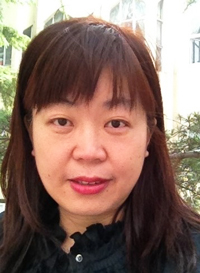|
组长:张福萍 博士、研究员 |
|
研究方向
1. T细胞分化为不同辅助性T细胞的转录调控机制; 2. 病毒感染与免疫; 3. 肠道菌群与肠炎发生机制研究。 研究内容及意义
1. 病毒与宿主互作及致病机制研究 新发突发传染病病原给人类健康带来严重威胁, 病原感染与宿主互作以及致病机制是生命科学领域研究的重点和难点。课题组致力于流感病毒、寨卡病毒等重要病毒感染后的宿主因子筛选,T细胞免疫以及动物模型的建立。 2. 病毒感染诱导TFH细胞分化机制的研究 滤泡辅助性T细胞(TFH)是近年来研究发现的一种特殊的辅助性T细胞亚群,在生发中心形成、B细胞活化和抗体类型转换中发挥作用。TFH细胞功能失调与自身免疫性疾病、免疫缺陷和肿瘤等多种疾病的发生相关, 而TFH细胞分化和命运的调控机制尚未阐明。课题组长期从事T细胞分化研究,前期发现多种因素参与TFH细胞的分化,将利用筛选出的转录因子,研究TFH细胞分化的调控机制以及对抗体产生的影响。 3. 肠道菌群与肠炎易感基因致病机制的关系 肠道菌群在人体健康中发挥着重要作用。宿主与肠道菌群在长期进化过程中相互作用,共同调节肠道内环境稳态。克罗恩病是一种危害人类健康的重大疾病,普遍认为宿主遗传易感因素、环境因素和肠道菌群改变等多因素共同导致克罗恩病的发生。课题组关注肠炎敏感基因多态性对肠道菌群和克罗恩病的影响。研究发现肠炎敏感基因的突变导致肠道菌群的平衡被破坏,肠道内环境的稳态发生改变。下一步将重点研究肠道菌群在克罗恩病发病过程中的关键作用及其调控免疫反应的具体机制, 这对推动克罗恩病的个性化治疗具有重要意义。 |
|
研究组长
张福萍,博士,研究员,博士生导师。 2001年获中国预防医学科学院病毒学研究所免疫学博士。在美国Vanderbilt Univesity医学中心和美国国立卫生院(NIH/NIAID)做博士后。 2011年底回国在中国科学院微生物研究所任研究员。长期从事免疫学研究,在研究方向上的代表性研究成果分别发表于国际免疫学权威学术刊物 Nature Immunology、Immunity、Journal of Experimental Medicine、PNAS。其中发表在Nature Immunology的文章被免疫学领域影响力最强的综述性期刊如 Nature Review Immunol (2009; 9: 106-105),Immunity(2009; 30: 646-655)和 Curr Opin Immunol (2009; 21:146-152)广泛引用。对细胞免疫调控机制的研究积累了丰富的经验。 |
|
主要学习及工作经历
1. 2011.03-至今 中国科学院微生物研究所,研究员,研究组长; 2. 2006-2011年 National institute of Health, IRTA fellow; 3. 2002-2006年 Vanderbilt University Medical Center, research fellow; 4. 1998-2001年 中国预防医学科学院病毒所,博士研究生; 5. 1989-1998年 新疆农业大学,讲师。 |
|
获奖情况 获微生物所2019年度“教书育人奖”。 |
|
研究团队
工作人员 高 平,助理研究员 陈晓彤,助理研究员 贾宝迁,助理研究员 韩小娟,助理研究员 在读研究生 刘丹丹,博士生 刘宏涛,博士生 翟笑雨,直博生 刘翔文,直博生 曹凯悦,硕士生 季 苗,硕士生 已毕业学生 韩小娟,博士 黄华鎔,硕士 刘馨远,硕士 |
|
代表性论文
1. Han X, Huang H, Gao P, Zhang Q, Liu X, Jia B, Warren Strober, Hou B, Zhou X, Gao GF, Zhang F*.E-protein regulatory network links TCR signaling to effector Treg cell differentiation,Proc Natl Acad Sci U S A. 2019, 116(10): 4471-4480. 2. Han X, Liu H, Huang H, Liu X, Jia B, Gao GF, Zhang F*. ID2 and ID3 are indispensable for Th1 cell differentiation during influenza virus infection in mice.Eur J Immunol. 2019, 49(3):476-489. 3. Huang H, Li S, Zhang Y, Han X, Jia B, Liu H, Liu D, Tan S, Wang Q, Bi Y, Liu WJ, Hou B, Gao GF*, Zhang F*. CD8+T Cell Immune Response in Immunocompetent Mice during Zika Virus Infection.J Virol. 2017, 91(22). 4. Gao P, Liu H, Huang H, Zhang Q, Strober W, Zhang F*. The Inflammatory Bowel Disease-Associated Autophagy Gene Atg16L1T300A Acts as a Dominant Negative Variant in Mice.J Immunol. 2017, 198(6): 2457-2467. 5. Gao P, Han X, Zhang Q, Yang Z, Fuss IJ, Myers TG, Gardina PJ, Zhang F*, Strober W*(2014). Dynamic changes in E-protein activity regulate T reg cell development.J Exp Med. 2014; 211 (13):2651-68. * Correspondence Author 6. Zhang, F*. , Fuss, I., Yang, Z., and Strober, W* (2014) Transcription of RORgt in Developing Th17 cells is Regulated by E-Protiens .Mucosal Immunology. 2014, 7(3):521-32. * Correspondence Author 7. Strober W, Zhang F, Kitani A, Fuss I, Fichtner-Feigl S. (2010) Proinflammatory cytokines underlying the inflammation of Crohn's disease.Curr Opin Gastroenterol. Jul; 26 (4):310-7. 8. Meng, G., Zhang, F., Fuss, I., Kitani, A., and Strober, W. (2009) A Mutation in the Nlrp3 Gene Causing Inflammasome Hyperactivation Potentiates Th17 Cell-Dominant Immune Responses.Immunity. 30:860-874. 9. Zhang, F., Meng, G. and Strobe, W. (2008) Interactions among transcription factors Runx1, RORt and Foxp3 regulate differentiation of interleukin17-producing T cells.Nature Immunology. 9 :1297-1306. 10. Zhang, F. and Boothby, M. (2006) Th1-specific Brg1 recruitment and remodeling of nucleosomes positioned at IFN-γ promoter is STAT4-dependent.J Exp Med. 203:1493-1505. 11. Corn, R.A., Aronica M.A., Zhang, F. et al. (2003) T cell-intrinsic requirement for NF-kappa B induction in post differentiation IFN-gamma production and clonal expansion in a Th1 response.Journal of Immunology. 171(4): 1816-1824. 12. Zhang, F., Zhang, J., Zhou, W. et al. (2002) Expression of PrPc as His-fusion form in a baculovirus system and conversion of expressed PrP-sen to PrP-res in cell-free system.Virus Research. 87:145-153. 13. Zhang, F., Dong, X., Zhou, W. et al. (2002) Cloning and expression of S100 protein and establishment method to test S100 protein.Chinese Journal of Experiment medicine. (1) 48-55. 14. Zhang, F., Dong, X., Sun, X. et al. (2000) Preparation and primary application of 14-3-3 specific polyclonal antibody.Chinese Journal of Neurology. 33(5) :331-335. 15. Zhang, F., Dong, X., Zhao, X. et al. (1999) cDNA cloning and expression in prokaryotic cells of neuron protein 14-3-3beta.Chinese Journal of Neurology. 32(4): 230-233. |





